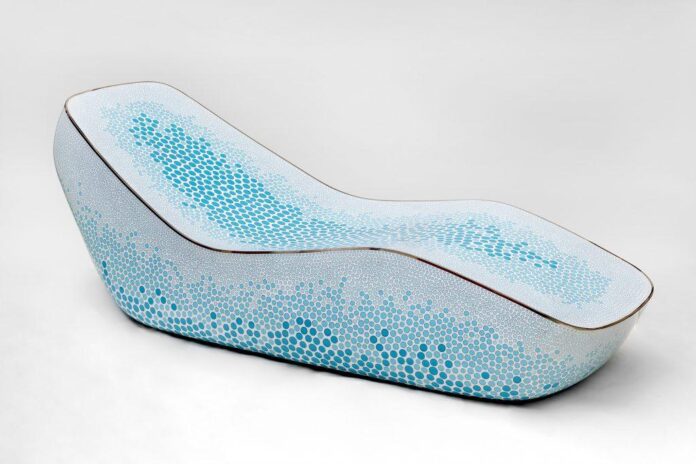Marc Newson is one of today’s most prominent designers. His Lockheed Lounge (ca. 1990), primarily made from fiberglass-reinforced polyester resin and aluminum, became the most expensive piece of design when it sold for £2.4 million ($3.7 million) at Phillips London in 2014.
But the 59-year-old Australian-born, London-based designer is chiefly motivated by problem-solving, setting himself complicated challenges to do with techniques and materials. This trailblazing vision, associating creativity and boundless curiosity, is evidenced in his new exhibition (January 25–March 18) at Gagosian on Rue de Castiglione in Paris.

Marc Newson. Courtesy of Gagosian Paris.
The intimate show brings together a variety of pieces made over the last few years. Most intriguing are a lounge sculpture and chair made from a cloisonné technique featuring dizzying patterns of small enamel circles. They were created in Beijing where Newson’s team built a factory that revitalized China’s centuries-old cloisonné enameling technique.
Artnet News spoke to Newson at the preview of his exhibition.
What sparked your interest in the cloisonné process and why did you want to recontextualize it in these new works?
When I was at art college, I did jewelry and silversmithing, and was always aware of this cloisonné process. Like in a lot of my work, I had ambitious ideas to upscale things, play with the scale, and do things on a scale that had never been done before, and people would be scratching their heads about how you did it. I had the vision in my head of these large-scale objects but we had no idea where and how we were going to do it, and whether the skills still existed.

Marc Newson, (2022). Courtesy of Gagosian Paris.
Cloisonné was perfected by the Chinese five or six centuries ago in Beijing. But, of course, I went to China and couldn’t find anyone to do it, ironically. The process was almost dying out. People could do small pieces but not large ones. So we had to find certain individuals who could recruit and retrain people.
We built this factory and got it up to a point where we could produce these crazy shapes which I don’t think they even could have done five or six centuries ago. There are 30 people executing steps along the way, doing the enamel and stuff. It’s a mad process.

Marc Newson, (2022). Courtesy of Gagosian Paris.
Also on view is Extruded Ribbon Console, carved entirely from Azul Macaubas quartzite but resembling machine-molding. Why did you choose this material?
It’s dealing with interior spaces versus exterior spaces. It’s as much about what you don’t see as about what you do see. The conceit is that it’s as if you’ve taken a completely rigid material and bent it like plasticine which, of course, you can’t do with marble, but people think you can. I like creating the illusion that you can do something with material that you really can’t.
How do ideas and knowledge gained from your industrial projects bleed into your sculptural projects and vice versa?
I’ve always done work like this and, at the other end of the spectrum, I’ve always done work in aviation, designing office chairs or products for the luxury sector—luggage for Louis Vuitton, shoes for Nike, perfume bottles, or pens for Montblanc. Each of them teaches me different things [and] the variety is what really helps me to do what I do. For me, design is a problem-solving exercise. I’m a gun for hire.

Marc Newson, (2017), an aluminum board that began as a prototype for big-wave surfer Garrett McNamara. Courtesy of Gagosian Paris.
Your best-known piece is the Lockheed Lounge (ca. 1990). You’ve talked about how, looking back, it feels like a sort of long-lost child. What problems did you want to solve when you made it?
I did that when I was in my early twenties. I was able to respond to the challenge that I set myself in a very limited way. I had a vision of this amorphous object in a shiny metal and the only way I could think to do it was to cover it in small panels. I wouldn’t do it like that anymore.
A video produced by “The Hour Glass” shows that you own works by the Belgian conceptual artist Wim Delvoye and Italian artist Alighiero Boetti, who was connected to the Arte Povera movement. What genres do you collect?
I’m not a huge collector; I have a few pieces. I love Wim’s work, he’s a friend, and I find it really funny and whimsical. I’m a big fan of everything that’s Italian, post-war—Arte Povera and the design that started coming out of Italy in the 1950s and 1960s. It was an incredibly interesting, fertile moment in time. Alighiero Boetti and Lucio Fontana are among my favorite artists, historically.
When clients approach you, do you feel pressured to live up to a certain reputation? How does your sculptural work counterbalance that?
[My sculptural] work allows me to be me and do things at my own cadence, although the pieces are difficult and complex. We do these sort of fun exhibitions in different parts of the world and can cherry-pick the [works] that we think will be appropriate.

























